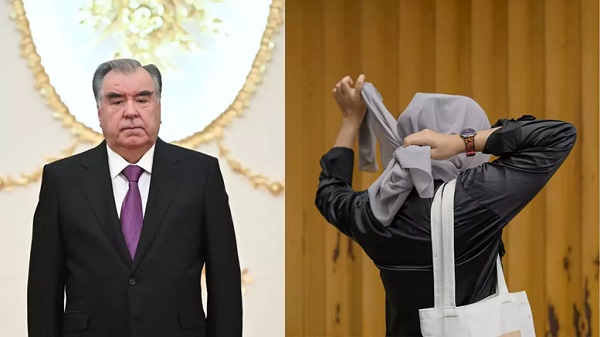Paromita Das
GG News Bureau
New Delhi, 24 June. Tajikistan, a country of around 9 million people, has a rich Islamic heritage, with over 90% of its population identifying as Muslim. Despite this, the government has maintained a secular stance, often implementing measures to curtail the influence of religion in public life. The Majlisi Milli, Tajikistan’s upper house of parliament, passed the controversial bill, prompting significant debate and criticism both domestically and internationally. These actions are part of a broader strategy aimed at preventing religious extremism and maintaining state control.
The New Legislation
After years of an unofficial crackdown on the hijab in the nation with a majority of Muslims, the bill was finally approved by the Majlisi Milli, the upper chamber of parliament, on June 19. The recent bill, approved by the Majlisi Milli, introduces several significant restrictions:
- Hijab Ban: The wearing of hijabs in public institutions, including schools, universities, and government buildings, is now prohibited. This move is aimed at promoting secularism and countering what the government views as growing radicalism. The new rule imposes severe fines of up to 7,920 somonis, or about $700, on anyone found wearing a hijab or any other prohibited religious article of apparel. Employers who let workers wear clothes that are forbidden face fines of 39,500 simonis ($3,500). If found in breach, government officials and religious leaders are subject to even harsher fines of 54,000–57,600 simonis ($4,800–$5,100).
- Prohibition on Children Celebrating Eid: Children under the age of 18 are banned from participating in public religious activities, including the celebration of Eid al-Fitr and Eid al-Adha. This provision is intended to prevent the early indoctrination of religious practices.According to government representatives, the purpose of these steps is to guarantee children’s “proper education and safety” over the holidays.
Government’s Justification
The Tajik government argues that these measures are necessary to preserve national security and secularism. President Emomali Rahmon has been vocal about the dangers of religious extremism, often citing regional instability and the threat of radical groups as key reasons for such laws. The government claims that these policies help to protect young people from radical influences and ensure their education in a secular environment.
Recently, Tajikistan has experienced a surge in the importation of Islamic apparel from the Middle East, which the government regards as a danger to the nation’s cultural character and a marker of extremism. President Emomali Rahmon called the hijab “foreign clothing” in a speech given in March. As an alternative, the government has long supported traditional Tajik national attire.
The new regulation is an increase in the unofficial ban on Islamic clothing in Tajikistan. The hijab was outlawed for students in 2007 and then expanded to include all public institutions. Additionally, authorities have reportedly forcefully shaved hundreds of men’s beards over the past ten years, discouraging males with thick facial hair.
Public and International Reaction
The new legislation has sparked a mix of reactions:
- Domestic Response: Within Tajikistan, opinions are divided. Some citizens support the government’s stance, viewing it as a safeguard against extremism. Others, particularly among the devout Muslim population, see it as an infringement on religious freedoms and a step towards authoritarianism.
- International Criticism: Human rights organizations and international bodies have condemned the bill, arguing that it violates fundamental human rights, including freedom of religion and expression. Amnesty International and Human Rights Watch have called for the immediate repeal of the legislation, urging Tajikistan to respect its citizens’ religious freedoms.
Historical Context
This is not the first time Tajikistan has imposed restrictions on religious practices. In recent years, the government has shut down mosques, prohibited the use of religious names, and even banned beards for men. These measures reflect a broader trend in Central Asia, where governments often seek to control religious expression to prevent extremism and maintain secular rule.
Conclusion
The passing of the new bill by the Majlisi Milli marks a significant development in Tajikistan’s ongoing efforts to regulate religious practices within its borders. While the government asserts that these measures are necessary for national security and secularism, the restrictions have ignited considerable controversy and debate. Balancing national security with religious freedoms remains a complex and contentious issue in Tajikistan and other secular states with significant Muslim populations. The future will reveal how these laws impact Tajik society and its relationship with the international community.


Comments are closed.